Tackling Food Waste in Barcelona’s Multicultural Culinary Scene
Introduction
Within the framework of the circularity in the built environment, where Material Flow Analysis (MFA) and system maps have played a crucial role, Barcelona’s multicultural culinary scene emerges as a fascinating case study. In this dynamic city, the convergence of diverse culinary traditions is not only a celebration of flavors but also an opportunity to address a pressing global challenge: food waste. This blog post explores how Barcelona’s culinary scene, with its rich diversity and sustainability efforts, intertwines with the principles of circularity, offering valuable insights into the potential of a circular economy in the built environment. Specifically, we delve into the innovative initiatives, collaborative networks, and systemic approaches that are reshaping the city’s culinary landscape and paving the way toward a more sustainable future.
Key Facts

However, behind the scenes of this gastronomic paradise lies a concerning truth: food waste. In our quest to understand and address this issue, we have uncovered some key facts that shed light on the scale of the problem. From the surplus of international cuisine to the global impact of food loss and waste, and the carbon footprint it leaves behind, these facts unveil the urgency and importance of tackling food waste in Barcelona’s culinary landscape.
Fact 1: 20% of Food Waste – Surplus from International Cuisine
According to FareShare, a UK-based food waste charity, approximately 20% of the food that goes to waste globally is surplus from international cuisine, including dishes from Indian, Chinese, and Italian culinary traditions. This staggering statistic highlights the significant contribution of diverse cuisines to the overall problem of food waste within Barcelona’s multicultural culinary scene.
Fact 2: 33% of Food Produced – Lost or Wasted Worldwide
A study conducted by the UN Food and Agriculture Organization (FAO) reveals that approximately 33% of the food produced worldwide for human consumption is lost or wasted at some point along the food chain. This sobering figure underscores the urgent need for concerted efforts to address food waste, not just in Barcelona, but on a global scale.
Fact 3: 1.3 Million Tons of CO2 Emissions – The Carbon Footprint of Food Waste in Barcelona
The Ajuntament de Barcelona (AMB) has identified that food waste in Barcelona contributes to approximately 1.3 million tons of CO2 emissions each year. These emissions arise from the decomposition of wasted food in landfills, contributing significantly to climate change. Recognizing the carbon footprint of food waste emphasizes the importance of implementing measures to combat food waste and foster sustainability within Barcelona’s culinary landscape.
Research Question
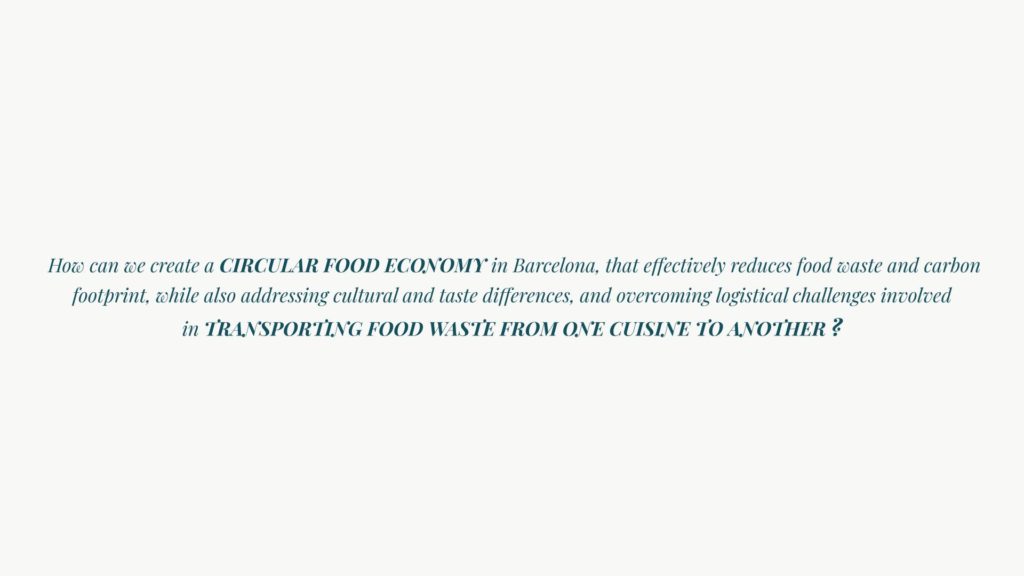
As we uncover the key facts surrounding food waste in Barcelona’s multicultural culinary scene, an essential question arises: How can we forge a circular food economy that not only effectively reduces food waste and its carbon footprint but also addresses cultural and taste differences? Furthermore, how can we overcome the logistical challenges involved in transporting food waste from one cuisine to another? These complex considerations demand innovative solutions and collaborative efforts from all stakeholders involved. In our pursuit of sustainability, it becomes crucial to explore strategies that embrace diversity, foster culinary exchange, and minimize waste within Barcelona’s vibrant gastronomic landscape.
Process

MFA | WASTE WEIGHT
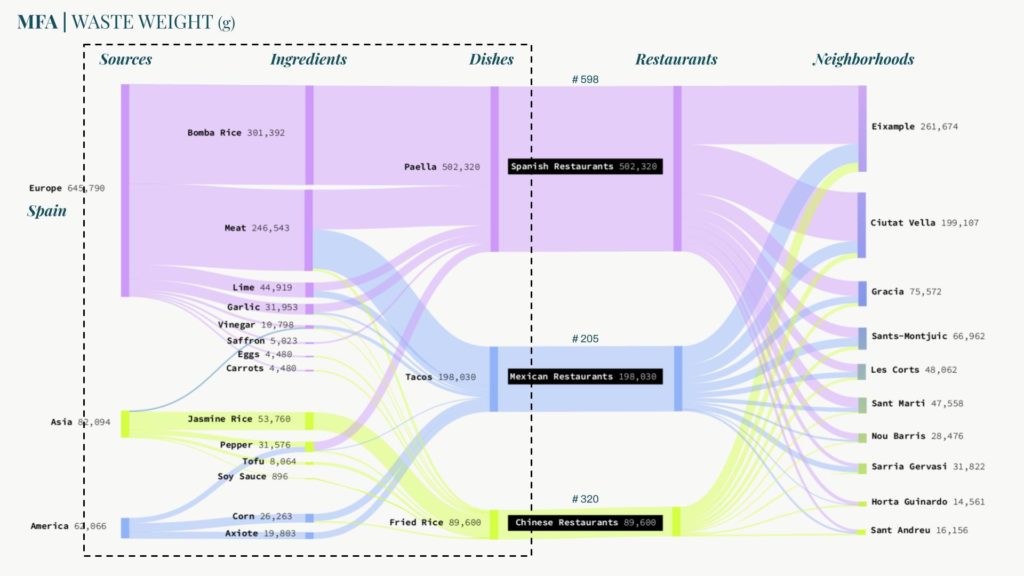
MFA | CARBON FOOTPRINT (kg CO2 e)

MFA | FRESH WATER USED IN PRODUCTION (L / Kg)
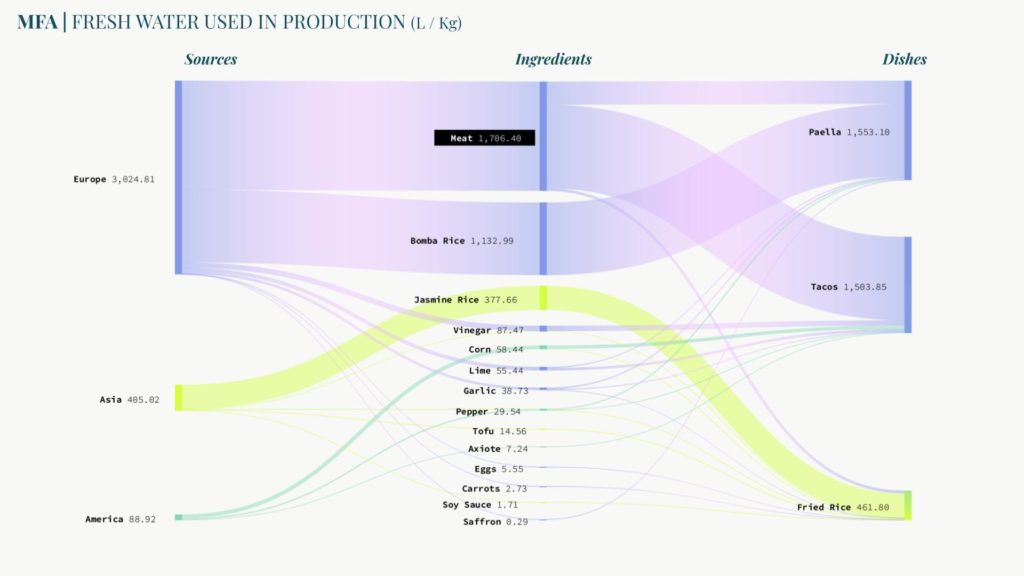
Insights
Through comprehensive Material Flow Analyses (MFA) conducted within Barcelona’s multicultural culinary scene, we have gained valuable insights that hold the key to unlocking the potential of a circular food economy. These insights encompass waste weight, water usage in production, and carbon footprint reduction, providing us with a roadmap to effectively address food waste while embracing cultural diversity.
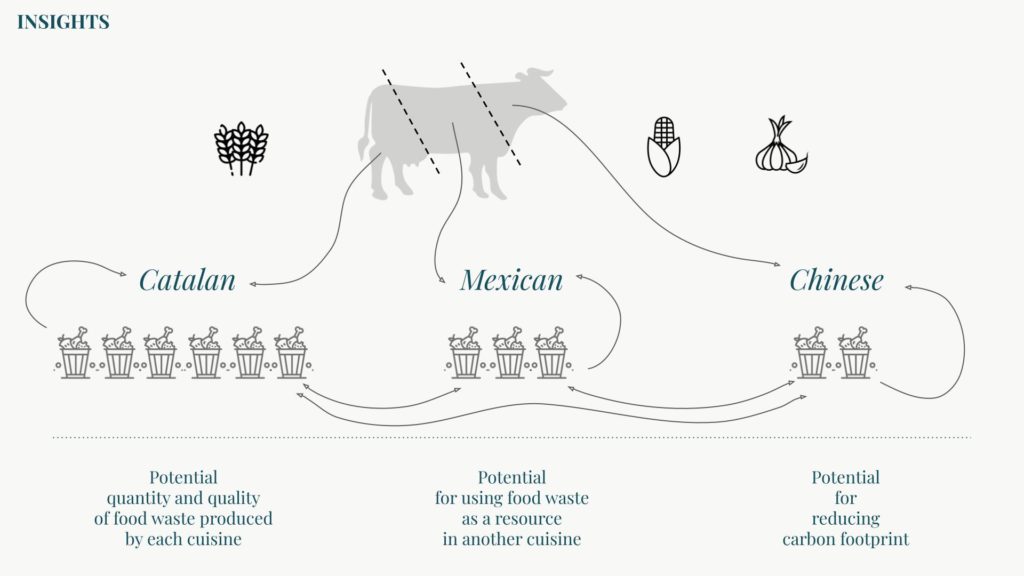
Firstly, the MFA assessments have shed light on the potential quantity and quality of food waste generated by each cuisine. By understanding the specific waste streams and their composition, we can identify opportunities for reducing waste and implementing innovative waste management strategies. This presents an exciting prospect for repurposing and utilizing food waste as a valuable resource in another cuisine, minimizing its environmental impact and maximizing its economic and culinary potential.
Secondly, the MFA analyses have revealed the significant water usage in the production of food within Barcelona’s multicultural culinary landscape. Recognizing this, we can explore water-saving measures and sustainable practices to minimize water consumption. By incorporating water-efficient techniques and fostering awareness about responsible water usage, we can contribute to the conservation of this precious resource while maintaining the diverse flavors and culinary traditions that make Barcelona’s food scene so vibrant.
Lastly, the MFA assessments have highlighted the substantial carbon footprint associated with food production and waste within Barcelona’s multicultural culinary scene. However, this knowledge also presents an opportunity for significant carbon footprint reduction. By implementing sustainable practices such as composting, anaerobic digestion, and energy-efficient operations, we can actively work towards minimizing emissions and mitigating the environmental impact of food waste.
The insights gained from these MFA analyses empower us to envision a circular food economy that embraces the uniqueness of each cuisine, fosters resource efficiency and minimizes waste throughout the entire food chain. By leveraging the potential of food waste as a resource, reducing water usage, and actively working towards carbon footprint reduction, Barcelona’s culinary scene can lead the way towards a more sustainable future, where cultural diversity and environmental stewardship go hand in hand.
Systems Map
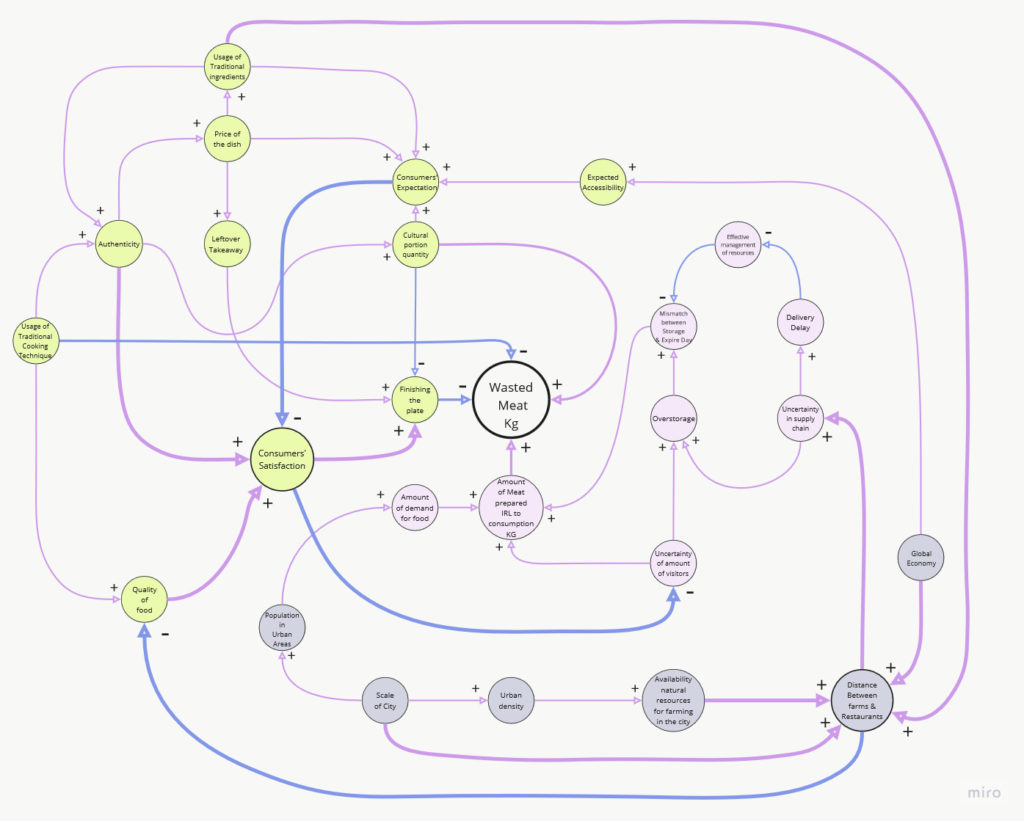


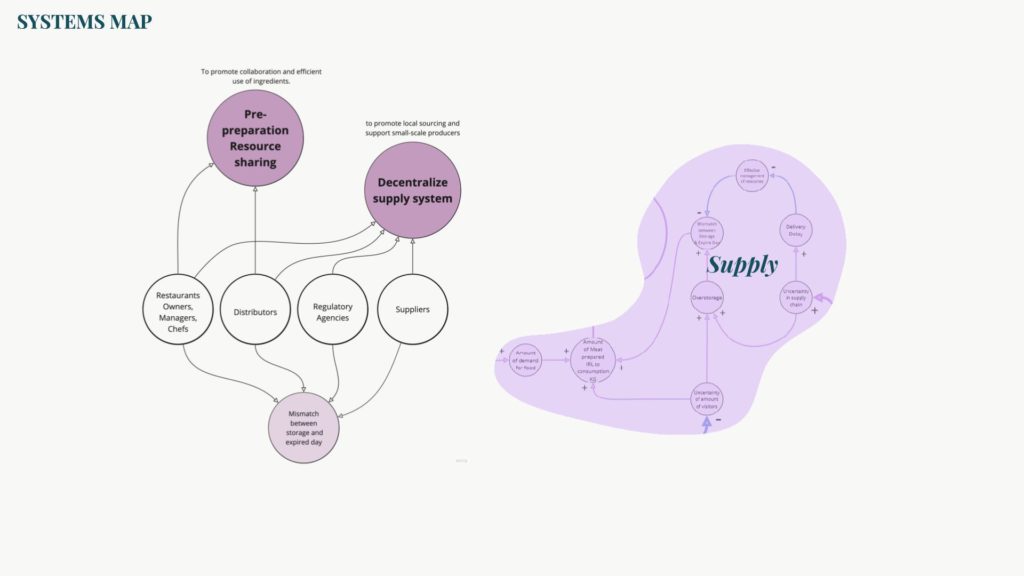

Conclusion
As we navigate the rich and diverse culinary landscape of Barcelona, it is essential to recognize that our current standards in cuisines may need to undergo a transformation in the face of impending challenges such as climate change and food scarcity. While it may be difficult to compromise our culinary expectations, it is crucial to acknowledge the impact that the industry has on the environment. By embracing the concept of a circular food economy, we can proactively address these issues, ensuring the sustainability and resilience of our food system for years to come. As we become increasingly aware of the environmental consequences of our choices, the need to minimize food waste, reduce water usage, and lower carbon footprints becomes imperative. By embracing innovative practices, fostering collaboration, and rethinking our consumption patterns, Barcelona’s culinary scene can lead the way in creating a more sustainable future. Let us acknowledge the urgent need for change, recognizing that compromising our culinary standards today will ultimately preserve the flavors and traditions we hold dear in the face of future challenges. Together, we can pave the path toward a harmonious balance between culinary excellence, environmental stewardship, and a resilient food system that sustains both the planet and our palates.

